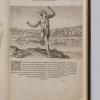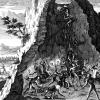Bartolomé de las Casas, A Short Account of the Destruction of the Indies (Frankfurt, 1598)
Commentary
In 1516, Bartholomew de las Casas was granted the title of ‘Protector of the Indians’ after submitting a report on their demographic decline, pushing him to focus on exposing the unfair treatment towards native Americans while still supporting Spanish colonialism. The text of ‘A Short Account of the Destruction of the Indies’ was first written in 1542. It was to be used during hearings that Charles V (1516-56) had ordered. Their purpose was to resolve the issues of forceful conversion and colonial exploitation. It was first published in 1552.
The book attempted to appeal to the Pathos of Charles’ son, Prince Phillip, by displaying the actions of the Spanish. This is shown clearly in the graphic illustrations, such as that on the open page. A priest burns a Native, presumably for heresy, while in the background Natives are run down by Spanish cavalry. Bartholomew noted that these crimes were being committed everywhere: in Hispaniola they allowed the Natives “no other food but herbage, and such kind of unsubstantial nutriment, so that the nursing women’s milk was exsiccated and so dryed up, that the young infants lately brought forth, all perished”, and in Cuba, “by the ferocity of one Spanish tyrant (whom I knew) above 200 Indians hanged themselves of their own accord”.
The illustrations were engraved by Theodor de Bry (1528-98), based on de las Casas’ descriptions. He also made the engravings for other Thomas Harriot’s A briefe and True Report of the New Found Land of Virginia, though he never went to America himself.
The Account’s most immediate consequence was that it was largely responsible for the passage of the New Laws of 1542, which accomplished one of De las Casas’ primary goals: the enslavement of Native Americans was abolished for the first time in European history. Beyond this, it led to the Valladolid debate (1550-51), which was the first moral debate in European history to discuss the rights and treatment of an indigenous people by conquerors.


